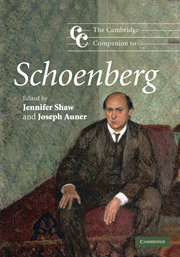Book contents
- Frontmatter
- 1 Introduction
- Part I Schoenberg's early years
- Part II Schoenberg, modernism, and modernity
- 6 Interpreting Erwartung: collaborative process and early reception
- 7 The rise and fall of radical athematicism
- 8 Schoenberg, modernism, and metaphysics
- 9 Pierrot lunaire: persona, voice, and the fabric of allusion
- Part III Schoenberg between the World Wars
- Part IV Schoenberg's American years
- Notes
- Select bibliography
- Index
6 - Interpreting Erwartung: collaborative process and early reception
from Part II - Schoenberg, modernism, and modernity
Published online by Cambridge University Press: 28 September 2011
- Frontmatter
- 1 Introduction
- Part I Schoenberg's early years
- Part II Schoenberg, modernism, and modernity
- 6 Interpreting Erwartung: collaborative process and early reception
- 7 The rise and fall of radical athematicism
- 8 Schoenberg, modernism, and metaphysics
- 9 Pierrot lunaire: persona, voice, and the fabric of allusion
- Part III Schoenberg between the World Wars
- Part IV Schoenberg's American years
- Notes
- Select bibliography
- Index
Summary
In 1909 Arnold Schoenberg completed his first work for the stage, the monodrama Erwartung (Expectation), Op. 17, on a text by Dr. Marie Pappenheim (1882–1966), a recent graduate of the University of Vienna medical school. Composed immediately following his Five Orchestral Pieces, Op. 16, Erwartung figures among Schoenberg's early atonal works and stands as one of the most notable achievements of musical modernism. It was here, it is widely held, that Schoenberg attained his goal of unmediated emotional expression through music, attested by his rapid composition and the apparent lack of thematic repetition over the half-hour course of the work. In spite of the vicissitudes of its performance history, Erwartung's spike in popularity in the 1990s demonstrates the emotional appeal and contemporary relevance of both its music and text.
The plot of the monodrama concerns a nameless Woman who has waited for her lover to visit and now seeks him. She traverses a dark, frightening forest, eventually finding his dead body near the house of another woman. The Woman experiences a wide range of emotions, including horror, jealousy, rage, forgiveness, and despair, finally leaving open the question of whether or how she can continue without her lover. The verbal and visual details of Pappenheim's libretto and Schoenberg's sensitive musical rendering of the text invest this simple plot with psychological depth and emotional salience.
- Type
- Chapter
- Information
- The Cambridge Companion to Schoenberg , pp. 79 - 93Publisher: Cambridge University PressPrint publication year: 2010



